Summative Report: Exploring Corporate Governance Theories in Australia
VerifiedAdded on 2021/02/20
|9
|3012
|256
Report
AI Summary
This report provides a detailed analysis of seminal theories in corporate governance and their impact on organizational effectiveness, particularly within the Australian context. It begins by outlining key theories, including agency theory, stewardship theory, and stakeholder theory, explaining their core principles and contributions to effective organizational operations. The report then delves into the practical applications of stewardship theory, exploring its contributions to both profit and non-profit organizations. Furthermore, it examines the crucial relationship between a leader's values, ethics, and their influence on effective governance within an organization. The report concludes by summarizing the key findings and implications of these theories for organizational success. The document is contributed by a student to be published on the website Desklib, which provides all the necessary AI-based study tools for students.
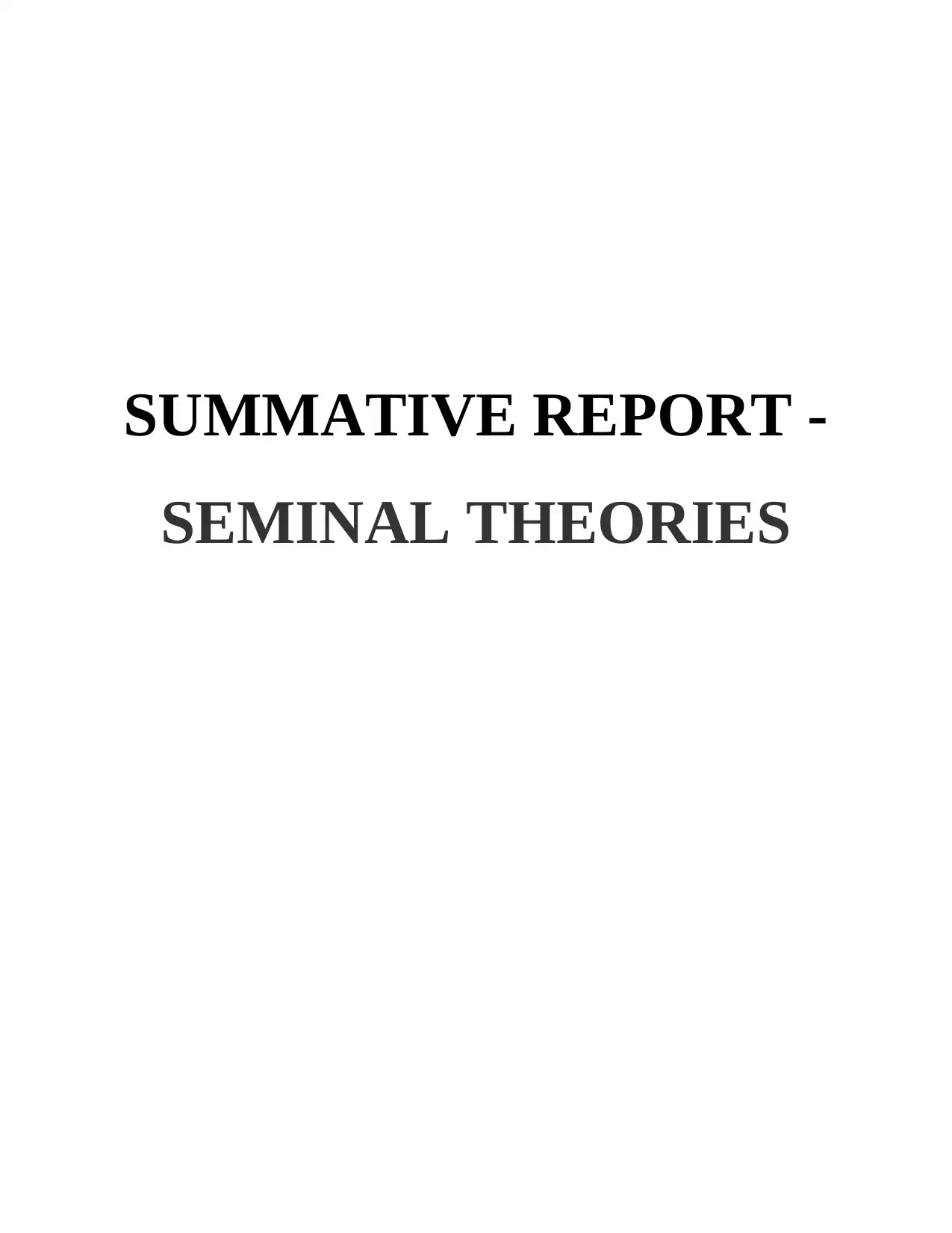
SUMMATIVE REPORT -
SEMINAL THEORIES
SEMINAL THEORIES
Paraphrase This Document
Need a fresh take? Get an instant paraphrase of this document with our AI Paraphraser
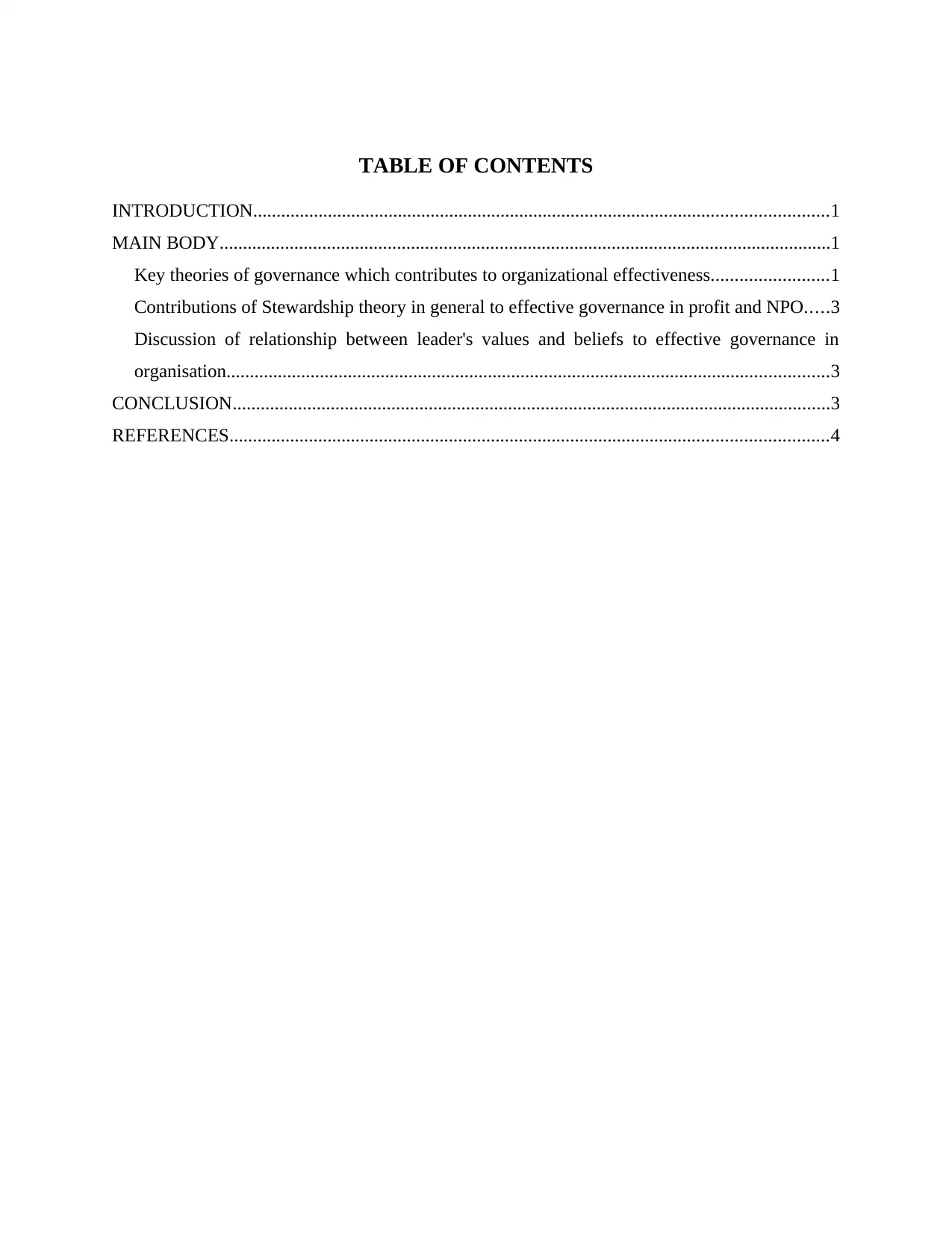
TABLE OF CONTENTS
INTRODUCTION...........................................................................................................................1
MAIN BODY...................................................................................................................................1
Key theories of governance which contributes to organizational effectiveness.........................1
Contributions of Stewardship theory in general to effective governance in profit and NPO.....3
Discussion of relationship between leader's values and beliefs to effective governance in
organisation.................................................................................................................................3
CONCLUSION................................................................................................................................3
REFERENCES................................................................................................................................4
INTRODUCTION...........................................................................................................................1
MAIN BODY...................................................................................................................................1
Key theories of governance which contributes to organizational effectiveness.........................1
Contributions of Stewardship theory in general to effective governance in profit and NPO.....3
Discussion of relationship between leader's values and beliefs to effective governance in
organisation.................................................................................................................................3
CONCLUSION................................................................................................................................3
REFERENCES................................................................................................................................4
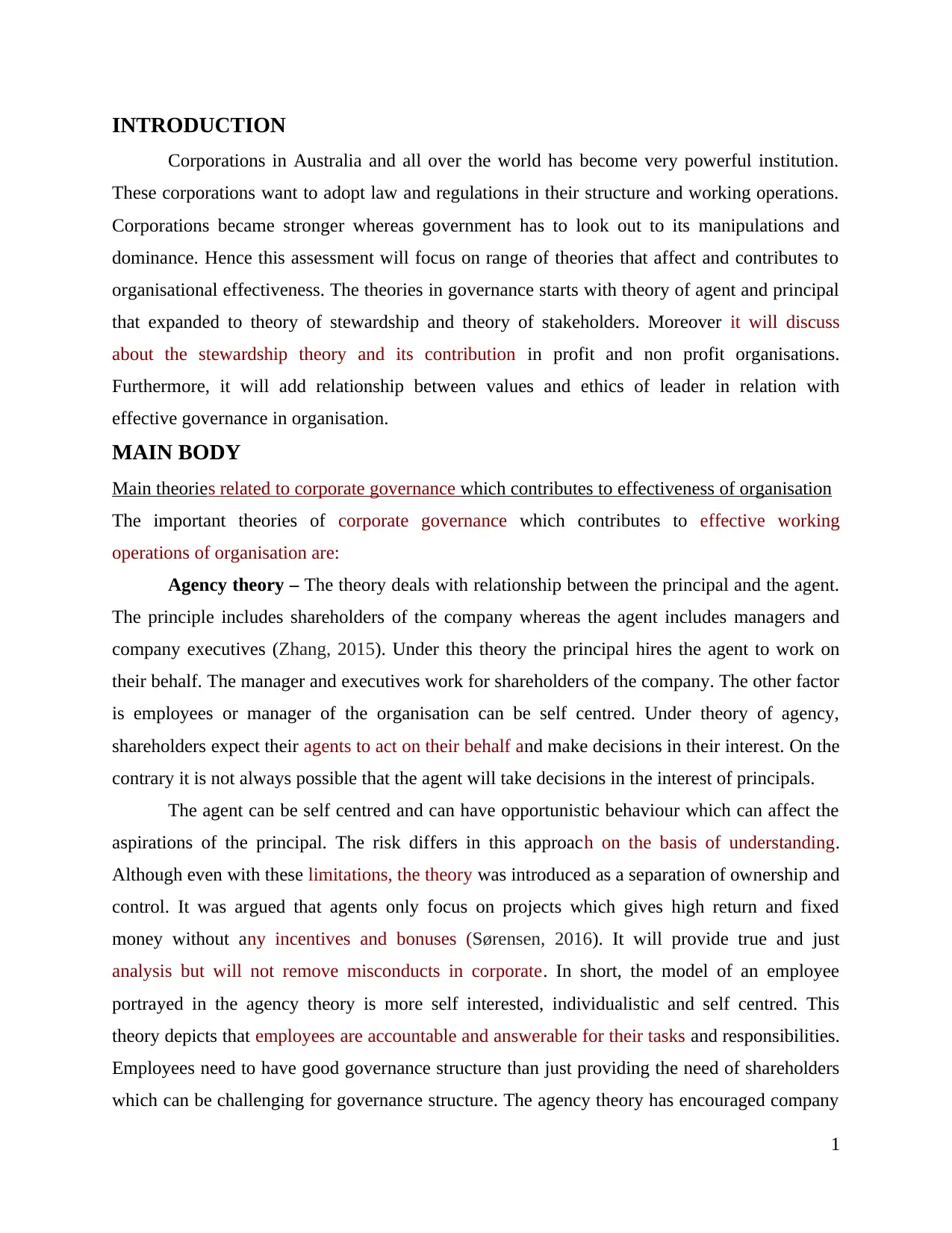
INTRODUCTION
Corporations in Australia and all over the world has become very powerful institution.
These corporations want to adopt law and regulations in their structure and working operations.
Corporations became stronger whereas government has to look out to its manipulations and
dominance. Hence this assessment will focus on range of theories that affect and contributes to
organisational effectiveness. The theories in governance starts with theory of agent and principal
that expanded to theory of stewardship and theory of stakeholders. Moreover it will discuss
about the stewardship theory and its contribution in profit and non profit organisations.
Furthermore, it will add relationship between values and ethics of leader in relation with
effective governance in organisation.
MAIN BODY
Main theories related to corporate governance which contributes to effectiveness of organisation
The important theories of corporate governance which contributes to effective working
operations of organisation are:
Agency theory – The theory deals with relationship between the principal and the agent.
The principle includes shareholders of the company whereas the agent includes managers and
company executives (Zhang, 2015). Under this theory the principal hires the agent to work on
their behalf. The manager and executives work for shareholders of the company. The other factor
is employees or manager of the organisation can be self centred. Under theory of agency,
shareholders expect their agents to act on their behalf and make decisions in their interest. On the
contrary it is not always possible that the agent will take decisions in the interest of principals.
The agent can be self centred and can have opportunistic behaviour which can affect the
aspirations of the principal. The risk differs in this approach on the basis of understanding.
Although even with these limitations, the theory was introduced as a separation of ownership and
control. It was argued that agents only focus on projects which gives high return and fixed
money without any incentives and bonuses (Sørensen, 2016). It will provide true and just
analysis but will not remove misconducts in corporate. In short, the model of an employee
portrayed in the agency theory is more self interested, individualistic and self centred. This
theory depicts that employees are accountable and answerable for their tasks and responsibilities.
Employees need to have good governance structure than just providing the need of shareholders
which can be challenging for governance structure. The agency theory has encouraged company
1
Corporations in Australia and all over the world has become very powerful institution.
These corporations want to adopt law and regulations in their structure and working operations.
Corporations became stronger whereas government has to look out to its manipulations and
dominance. Hence this assessment will focus on range of theories that affect and contributes to
organisational effectiveness. The theories in governance starts with theory of agent and principal
that expanded to theory of stewardship and theory of stakeholders. Moreover it will discuss
about the stewardship theory and its contribution in profit and non profit organisations.
Furthermore, it will add relationship between values and ethics of leader in relation with
effective governance in organisation.
MAIN BODY
Main theories related to corporate governance which contributes to effectiveness of organisation
The important theories of corporate governance which contributes to effective working
operations of organisation are:
Agency theory – The theory deals with relationship between the principal and the agent.
The principle includes shareholders of the company whereas the agent includes managers and
company executives (Zhang, 2015). Under this theory the principal hires the agent to work on
their behalf. The manager and executives work for shareholders of the company. The other factor
is employees or manager of the organisation can be self centred. Under theory of agency,
shareholders expect their agents to act on their behalf and make decisions in their interest. On the
contrary it is not always possible that the agent will take decisions in the interest of principals.
The agent can be self centred and can have opportunistic behaviour which can affect the
aspirations of the principal. The risk differs in this approach on the basis of understanding.
Although even with these limitations, the theory was introduced as a separation of ownership and
control. It was argued that agents only focus on projects which gives high return and fixed
money without any incentives and bonuses (Sørensen, 2016). It will provide true and just
analysis but will not remove misconducts in corporate. In short, the model of an employee
portrayed in the agency theory is more self interested, individualistic and self centred. This
theory depicts that employees are accountable and answerable for their tasks and responsibilities.
Employees need to have good governance structure than just providing the need of shareholders
which can be challenging for governance structure. The agency theory has encouraged company
1
⊘ This is a preview!⊘
Do you want full access?
Subscribe today to unlock all pages.

Trusted by 1+ million students worldwide
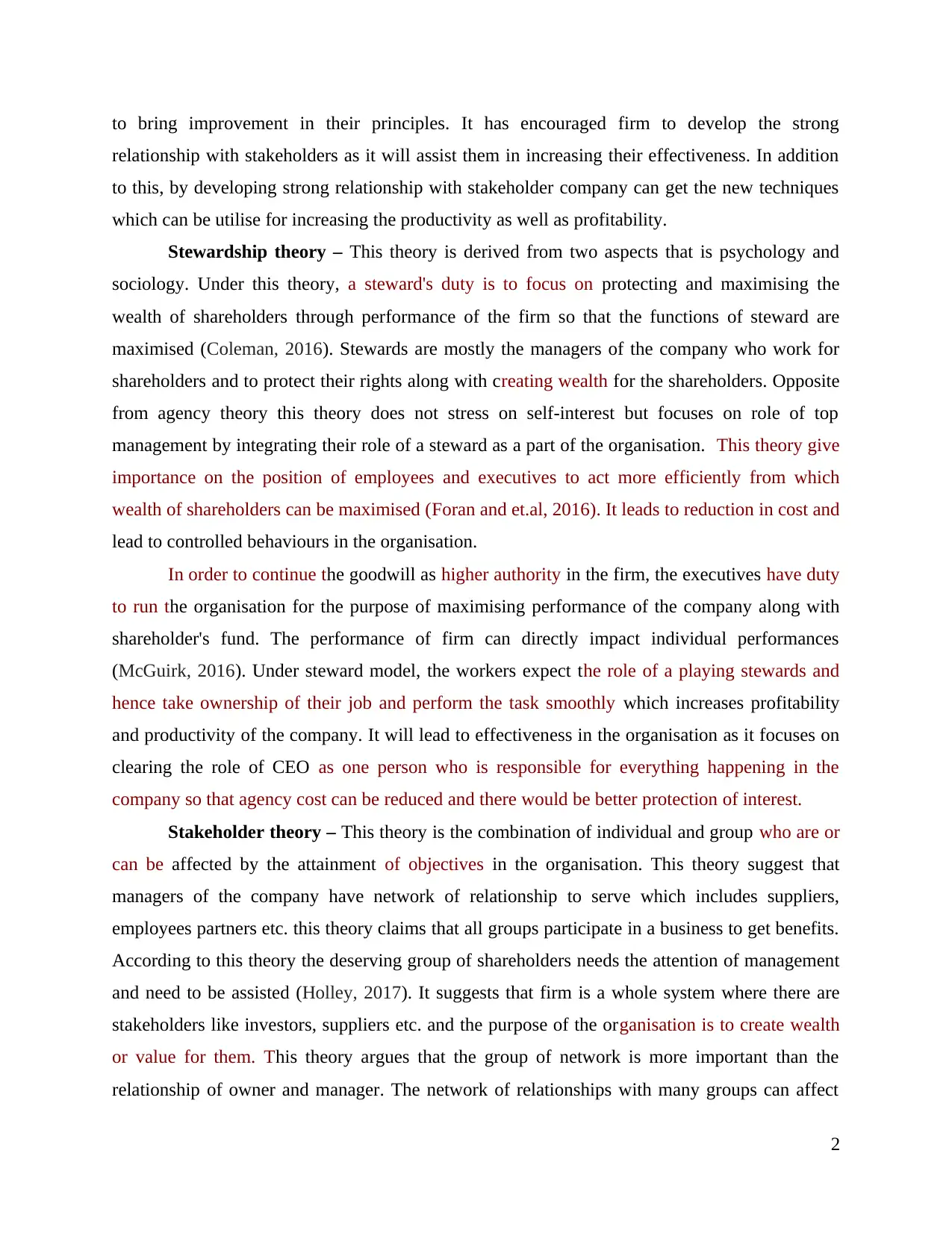
to bring improvement in their principles. It has encouraged firm to develop the strong
relationship with stakeholders as it will assist them in increasing their effectiveness. In addition
to this, by developing strong relationship with stakeholder company can get the new techniques
which can be utilise for increasing the productivity as well as profitability.
Stewardship theory – This theory is derived from two aspects that is psychology and
sociology. Under this theory, a steward's duty is to focus on protecting and maximising the
wealth of shareholders through performance of the firm so that the functions of steward are
maximised (Coleman, 2016). Stewards are mostly the managers of the company who work for
shareholders and to protect their rights along with creating wealth for the shareholders. Opposite
from agency theory this theory does not stress on self-interest but focuses on role of top
management by integrating their role of a steward as a part of the organisation. This theory give
importance on the position of employees and executives to act more efficiently from which
wealth of shareholders can be maximised (Foran and et.al, 2016). It leads to reduction in cost and
lead to controlled behaviours in the organisation.
In order to continue the goodwill as higher authority in the firm, the executives have duty
to run the organisation for the purpose of maximising performance of the company along with
shareholder's fund. The performance of firm can directly impact individual performances
(McGuirk, 2016). Under steward model, the workers expect the role of a playing stewards and
hence take ownership of their job and perform the task smoothly which increases profitability
and productivity of the company. It will lead to effectiveness in the organisation as it focuses on
clearing the role of CEO as one person who is responsible for everything happening in the
company so that agency cost can be reduced and there would be better protection of interest.
Stakeholder theory – This theory is the combination of individual and group who are or
can be affected by the attainment of objectives in the organisation. This theory suggest that
managers of the company have network of relationship to serve which includes suppliers,
employees partners etc. this theory claims that all groups participate in a business to get benefits.
According to this theory the deserving group of shareholders needs the attention of management
and need to be assisted (Holley, 2017). It suggests that firm is a whole system where there are
stakeholders like investors, suppliers etc. and the purpose of the organisation is to create wealth
or value for them. This theory argues that the group of network is more important than the
relationship of owner and manager. The network of relationships with many groups can affect
2
relationship with stakeholders as it will assist them in increasing their effectiveness. In addition
to this, by developing strong relationship with stakeholder company can get the new techniques
which can be utilise for increasing the productivity as well as profitability.
Stewardship theory – This theory is derived from two aspects that is psychology and
sociology. Under this theory, a steward's duty is to focus on protecting and maximising the
wealth of shareholders through performance of the firm so that the functions of steward are
maximised (Coleman, 2016). Stewards are mostly the managers of the company who work for
shareholders and to protect their rights along with creating wealth for the shareholders. Opposite
from agency theory this theory does not stress on self-interest but focuses on role of top
management by integrating their role of a steward as a part of the organisation. This theory give
importance on the position of employees and executives to act more efficiently from which
wealth of shareholders can be maximised (Foran and et.al, 2016). It leads to reduction in cost and
lead to controlled behaviours in the organisation.
In order to continue the goodwill as higher authority in the firm, the executives have duty
to run the organisation for the purpose of maximising performance of the company along with
shareholder's fund. The performance of firm can directly impact individual performances
(McGuirk, 2016). Under steward model, the workers expect the role of a playing stewards and
hence take ownership of their job and perform the task smoothly which increases profitability
and productivity of the company. It will lead to effectiveness in the organisation as it focuses on
clearing the role of CEO as one person who is responsible for everything happening in the
company so that agency cost can be reduced and there would be better protection of interest.
Stakeholder theory – This theory is the combination of individual and group who are or
can be affected by the attainment of objectives in the organisation. This theory suggest that
managers of the company have network of relationship to serve which includes suppliers,
employees partners etc. this theory claims that all groups participate in a business to get benefits.
According to this theory the deserving group of shareholders needs the attention of management
and need to be assisted (Holley, 2017). It suggests that firm is a whole system where there are
stakeholders like investors, suppliers etc. and the purpose of the organisation is to create wealth
or value for them. This theory argues that the group of network is more important than the
relationship of owner and manager. The network of relationships with many groups can affect
2
Paraphrase This Document
Need a fresh take? Get an instant paraphrase of this document with our AI Paraphraser
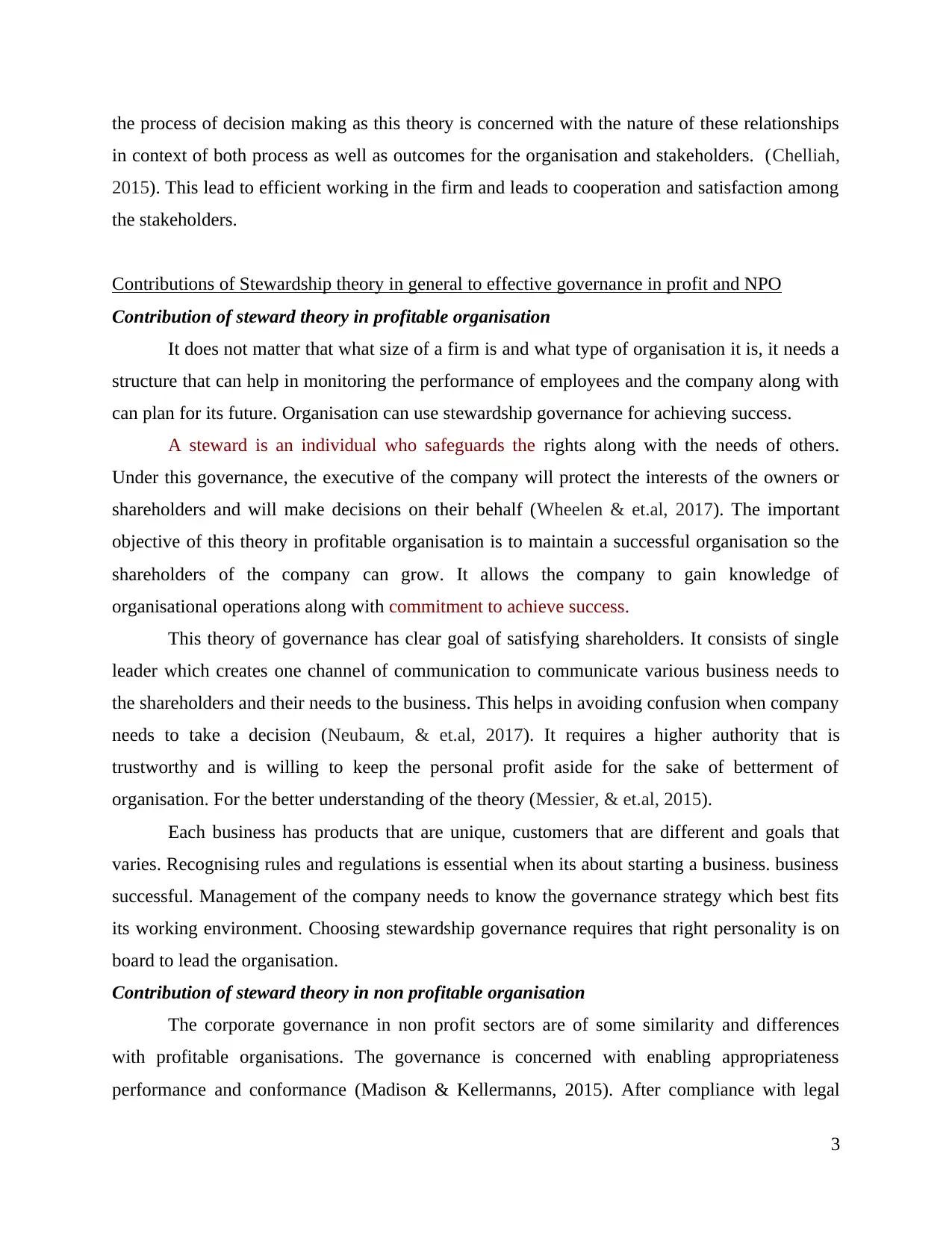
the process of decision making as this theory is concerned with the nature of these relationships
in context of both process as well as outcomes for the organisation and stakeholders. (Chelliah,
2015). This lead to efficient working in the firm and leads to cooperation and satisfaction among
the stakeholders.
Contributions of Stewardship theory in general to effective governance in profit and NPO
Contribution of steward theory in profitable organisation
It does not matter that what size of a firm is and what type of organisation it is, it needs a
structure that can help in monitoring the performance of employees and the company along with
can plan for its future. Organisation can use stewardship governance for achieving success.
A steward is an individual who safeguards the rights along with the needs of others.
Under this governance, the executive of the company will protect the interests of the owners or
shareholders and will make decisions on their behalf (Wheelen & et.al, 2017). The important
objective of this theory in profitable organisation is to maintain a successful organisation so the
shareholders of the company can grow. It allows the company to gain knowledge of
organisational operations along with commitment to achieve success.
This theory of governance has clear goal of satisfying shareholders. It consists of single
leader which creates one channel of communication to communicate various business needs to
the shareholders and their needs to the business. This helps in avoiding confusion when company
needs to take a decision (Neubaum, & et.al, 2017). It requires a higher authority that is
trustworthy and is willing to keep the personal profit aside for the sake of betterment of
organisation. For the better understanding of the theory (Messier, & et.al, 2015).
Each business has products that are unique, customers that are different and goals that
varies. Recognising rules and regulations is essential when its about starting a business. business
successful. Management of the company needs to know the governance strategy which best fits
its working environment. Choosing stewardship governance requires that right personality is on
board to lead the organisation.
Contribution of steward theory in non profitable organisation
The corporate governance in non profit sectors are of some similarity and differences
with profitable organisations. The governance is concerned with enabling appropriateness
performance and conformance (Madison & Kellermanns, 2015). After compliance with legal
3
in context of both process as well as outcomes for the organisation and stakeholders. (Chelliah,
2015). This lead to efficient working in the firm and leads to cooperation and satisfaction among
the stakeholders.
Contributions of Stewardship theory in general to effective governance in profit and NPO
Contribution of steward theory in profitable organisation
It does not matter that what size of a firm is and what type of organisation it is, it needs a
structure that can help in monitoring the performance of employees and the company along with
can plan for its future. Organisation can use stewardship governance for achieving success.
A steward is an individual who safeguards the rights along with the needs of others.
Under this governance, the executive of the company will protect the interests of the owners or
shareholders and will make decisions on their behalf (Wheelen & et.al, 2017). The important
objective of this theory in profitable organisation is to maintain a successful organisation so the
shareholders of the company can grow. It allows the company to gain knowledge of
organisational operations along with commitment to achieve success.
This theory of governance has clear goal of satisfying shareholders. It consists of single
leader which creates one channel of communication to communicate various business needs to
the shareholders and their needs to the business. This helps in avoiding confusion when company
needs to take a decision (Neubaum, & et.al, 2017). It requires a higher authority that is
trustworthy and is willing to keep the personal profit aside for the sake of betterment of
organisation. For the better understanding of the theory (Messier, & et.al, 2015).
Each business has products that are unique, customers that are different and goals that
varies. Recognising rules and regulations is essential when its about starting a business. business
successful. Management of the company needs to know the governance strategy which best fits
its working environment. Choosing stewardship governance requires that right personality is on
board to lead the organisation.
Contribution of steward theory in non profitable organisation
The corporate governance in non profit sectors are of some similarity and differences
with profitable organisations. The governance is concerned with enabling appropriateness
performance and conformance (Madison & Kellermanns, 2015). After compliance with legal
3
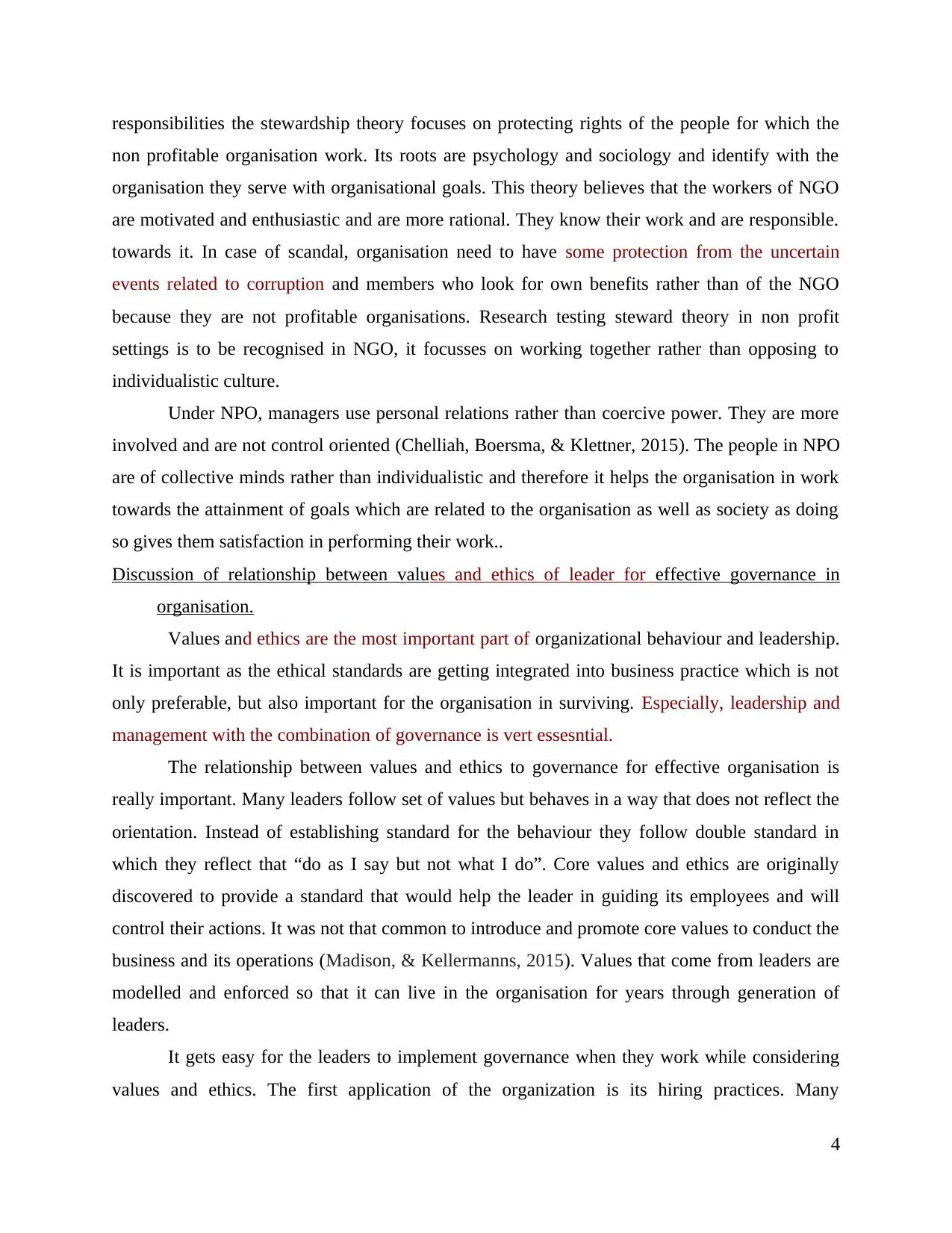
responsibilities the stewardship theory focuses on protecting rights of the people for which the
non profitable organisation work. Its roots are psychology and sociology and identify with the
organisation they serve with organisational goals. This theory believes that the workers of NGO
are motivated and enthusiastic and are more rational. They know their work and are responsible.
towards it. In case of scandal, organisation need to have some protection from the uncertain
events related to corruption and members who look for own benefits rather than of the NGO
because they are not profitable organisations. Research testing steward theory in non profit
settings is to be recognised in NGO, it focusses on working together rather than opposing to
individualistic culture.
Under NPO, managers use personal relations rather than coercive power. They are more
involved and are not control oriented (Chelliah, Boersma, & Klettner, 2015). The people in NPO
are of collective minds rather than individualistic and therefore it helps the organisation in work
towards the attainment of goals which are related to the organisation as well as society as doing
so gives them satisfaction in performing their work..
Discussion of relationship between values and ethics of leader for effective governance in
organisation.
Values and ethics are the most important part of organizational behaviour and leadership.
It is important as the ethical standards are getting integrated into business practice which is not
only preferable, but also important for the organisation in surviving. Especially, leadership and
management with the combination of governance is vert essesntial.
The relationship between values and ethics to governance for effective organisation is
really important. Many leaders follow set of values but behaves in a way that does not reflect the
orientation. Instead of establishing standard for the behaviour they follow double standard in
which they reflect that “do as I say but not what I do”. Core values and ethics are originally
discovered to provide a standard that would help the leader in guiding its employees and will
control their actions. It was not that common to introduce and promote core values to conduct the
business and its operations (Madison, & Kellermanns, 2015). Values that come from leaders are
modelled and enforced so that it can live in the organisation for years through generation of
leaders.
It gets easy for the leaders to implement governance when they work while considering
values and ethics. The first application of the organization is its hiring practices. Many
4
non profitable organisation work. Its roots are psychology and sociology and identify with the
organisation they serve with organisational goals. This theory believes that the workers of NGO
are motivated and enthusiastic and are more rational. They know their work and are responsible.
towards it. In case of scandal, organisation need to have some protection from the uncertain
events related to corruption and members who look for own benefits rather than of the NGO
because they are not profitable organisations. Research testing steward theory in non profit
settings is to be recognised in NGO, it focusses on working together rather than opposing to
individualistic culture.
Under NPO, managers use personal relations rather than coercive power. They are more
involved and are not control oriented (Chelliah, Boersma, & Klettner, 2015). The people in NPO
are of collective minds rather than individualistic and therefore it helps the organisation in work
towards the attainment of goals which are related to the organisation as well as society as doing
so gives them satisfaction in performing their work..
Discussion of relationship between values and ethics of leader for effective governance in
organisation.
Values and ethics are the most important part of organizational behaviour and leadership.
It is important as the ethical standards are getting integrated into business practice which is not
only preferable, but also important for the organisation in surviving. Especially, leadership and
management with the combination of governance is vert essesntial.
The relationship between values and ethics to governance for effective organisation is
really important. Many leaders follow set of values but behaves in a way that does not reflect the
orientation. Instead of establishing standard for the behaviour they follow double standard in
which they reflect that “do as I say but not what I do”. Core values and ethics are originally
discovered to provide a standard that would help the leader in guiding its employees and will
control their actions. It was not that common to introduce and promote core values to conduct the
business and its operations (Madison, & Kellermanns, 2015). Values that come from leaders are
modelled and enforced so that it can live in the organisation for years through generation of
leaders.
It gets easy for the leaders to implement governance when they work while considering
values and ethics. The first application of the organization is its hiring practices. Many
4
⊘ This is a preview!⊘
Do you want full access?
Subscribe today to unlock all pages.

Trusted by 1+ million students worldwide
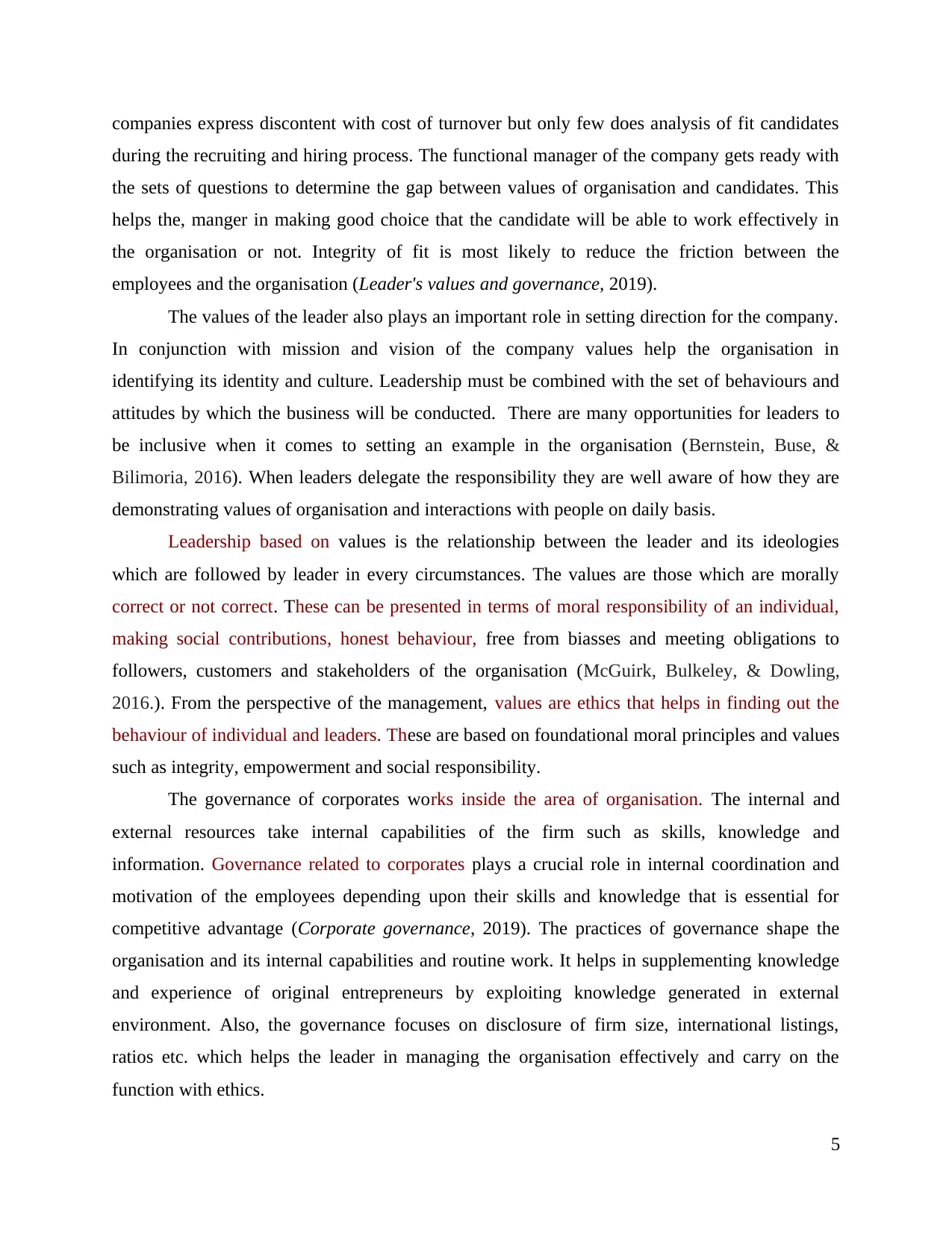
companies express discontent with cost of turnover but only few does analysis of fit candidates
during the recruiting and hiring process. The functional manager of the company gets ready with
the sets of questions to determine the gap between values of organisation and candidates. This
helps the, manger in making good choice that the candidate will be able to work effectively in
the organisation or not. Integrity of fit is most likely to reduce the friction between the
employees and the organisation (Leader's values and governance, 2019).
The values of the leader also plays an important role in setting direction for the company.
In conjunction with mission and vision of the company values help the organisation in
identifying its identity and culture. Leadership must be combined with the set of behaviours and
attitudes by which the business will be conducted. There are many opportunities for leaders to
be inclusive when it comes to setting an example in the organisation (Bernstein, Buse, &
Bilimoria, 2016). When leaders delegate the responsibility they are well aware of how they are
demonstrating values of organisation and interactions with people on daily basis.
Leadership based on values is the relationship between the leader and its ideologies
which are followed by leader in every circumstances. The values are those which are morally
correct or not correct. These can be presented in terms of moral responsibility of an individual,
making social contributions, honest behaviour, free from biasses and meeting obligations to
followers, customers and stakeholders of the organisation (McGuirk, Bulkeley, & Dowling,
2016.). From the perspective of the management, values are ethics that helps in finding out the
behaviour of individual and leaders. These are based on foundational moral principles and values
such as integrity, empowerment and social responsibility.
The governance of corporates works inside the area of organisation. The internal and
external resources take internal capabilities of the firm such as skills, knowledge and
information. Governance related to corporates plays a crucial role in internal coordination and
motivation of the employees depending upon their skills and knowledge that is essential for
competitive advantage (Corporate governance, 2019). The practices of governance shape the
organisation and its internal capabilities and routine work. It helps in supplementing knowledge
and experience of original entrepreneurs by exploiting knowledge generated in external
environment. Also, the governance focuses on disclosure of firm size, international listings,
ratios etc. which helps the leader in managing the organisation effectively and carry on the
function with ethics.
5
during the recruiting and hiring process. The functional manager of the company gets ready with
the sets of questions to determine the gap between values of organisation and candidates. This
helps the, manger in making good choice that the candidate will be able to work effectively in
the organisation or not. Integrity of fit is most likely to reduce the friction between the
employees and the organisation (Leader's values and governance, 2019).
The values of the leader also plays an important role in setting direction for the company.
In conjunction with mission and vision of the company values help the organisation in
identifying its identity and culture. Leadership must be combined with the set of behaviours and
attitudes by which the business will be conducted. There are many opportunities for leaders to
be inclusive when it comes to setting an example in the organisation (Bernstein, Buse, &
Bilimoria, 2016). When leaders delegate the responsibility they are well aware of how they are
demonstrating values of organisation and interactions with people on daily basis.
Leadership based on values is the relationship between the leader and its ideologies
which are followed by leader in every circumstances. The values are those which are morally
correct or not correct. These can be presented in terms of moral responsibility of an individual,
making social contributions, honest behaviour, free from biasses and meeting obligations to
followers, customers and stakeholders of the organisation (McGuirk, Bulkeley, & Dowling,
2016.). From the perspective of the management, values are ethics that helps in finding out the
behaviour of individual and leaders. These are based on foundational moral principles and values
such as integrity, empowerment and social responsibility.
The governance of corporates works inside the area of organisation. The internal and
external resources take internal capabilities of the firm such as skills, knowledge and
information. Governance related to corporates plays a crucial role in internal coordination and
motivation of the employees depending upon their skills and knowledge that is essential for
competitive advantage (Corporate governance, 2019). The practices of governance shape the
organisation and its internal capabilities and routine work. It helps in supplementing knowledge
and experience of original entrepreneurs by exploiting knowledge generated in external
environment. Also, the governance focuses on disclosure of firm size, international listings,
ratios etc. which helps the leader in managing the organisation effectively and carry on the
function with ethics.
5
Paraphrase This Document
Need a fresh take? Get an instant paraphrase of this document with our AI Paraphraser
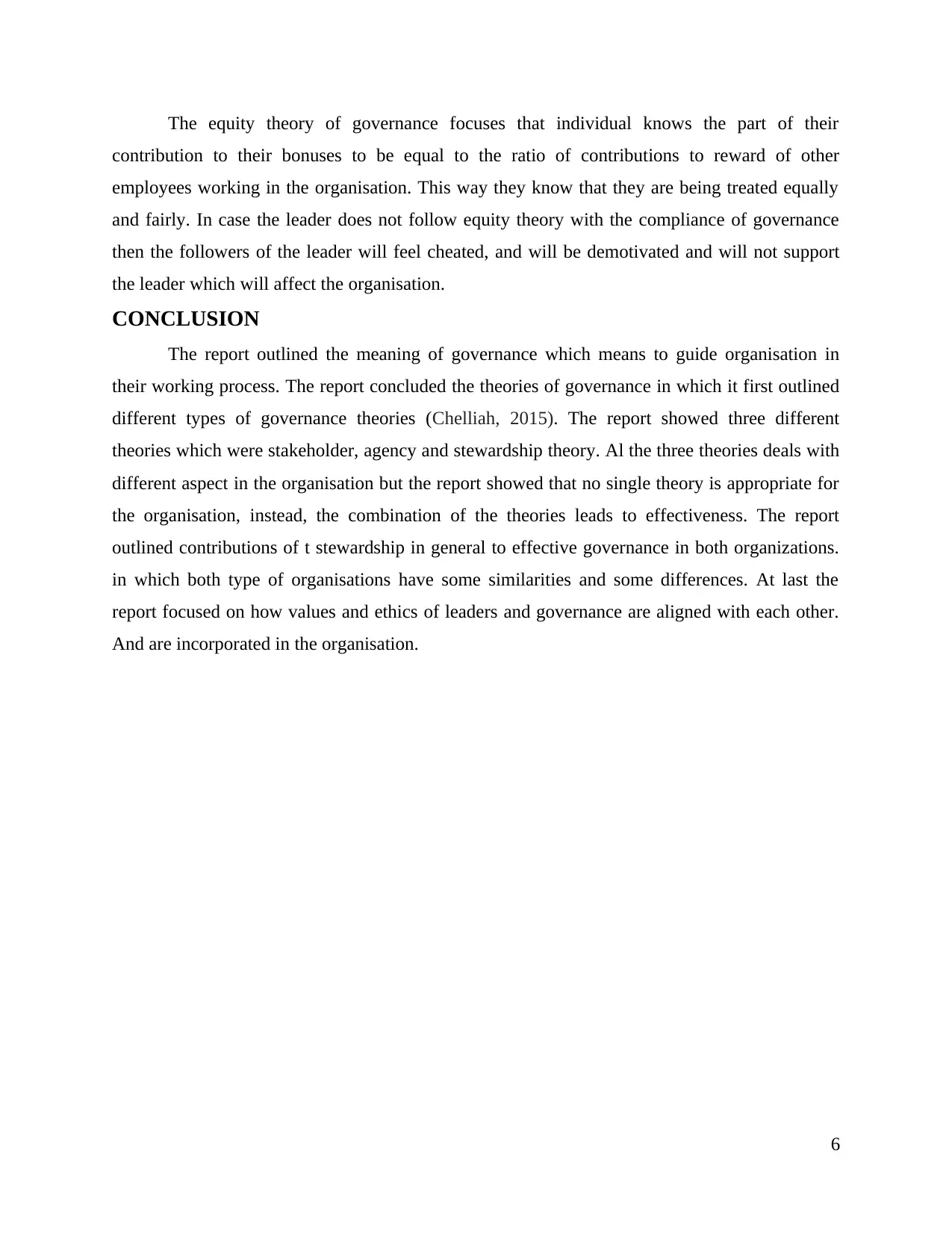
The equity theory of governance focuses that individual knows the part of their
contribution to their bonuses to be equal to the ratio of contributions to reward of other
employees working in the organisation. This way they know that they are being treated equally
and fairly. In case the leader does not follow equity theory with the compliance of governance
then the followers of the leader will feel cheated, and will be demotivated and will not support
the leader which will affect the organisation.
CONCLUSION
The report outlined the meaning of governance which means to guide organisation in
their working process. The report concluded the theories of governance in which it first outlined
different types of governance theories (Chelliah, 2015). The report showed three different
theories which were stakeholder, agency and stewardship theory. Al the three theories deals with
different aspect in the organisation but the report showed that no single theory is appropriate for
the organisation, instead, the combination of the theories leads to effectiveness. The report
outlined contributions of t stewardship in general to effective governance in both organizations.
in which both type of organisations have some similarities and some differences. At last the
report focused on how values and ethics of leaders and governance are aligned with each other.
And are incorporated in the organisation.
6
contribution to their bonuses to be equal to the ratio of contributions to reward of other
employees working in the organisation. This way they know that they are being treated equally
and fairly. In case the leader does not follow equity theory with the compliance of governance
then the followers of the leader will feel cheated, and will be demotivated and will not support
the leader which will affect the organisation.
CONCLUSION
The report outlined the meaning of governance which means to guide organisation in
their working process. The report concluded the theories of governance in which it first outlined
different types of governance theories (Chelliah, 2015). The report showed three different
theories which were stakeholder, agency and stewardship theory. Al the three theories deals with
different aspect in the organisation but the report showed that no single theory is appropriate for
the organisation, instead, the combination of the theories leads to effectiveness. The report
outlined contributions of t stewardship in general to effective governance in both organizations.
in which both type of organisations have some similarities and some differences. At last the
report focused on how values and ethics of leaders and governance are aligned with each other.
And are incorporated in the organisation.
6
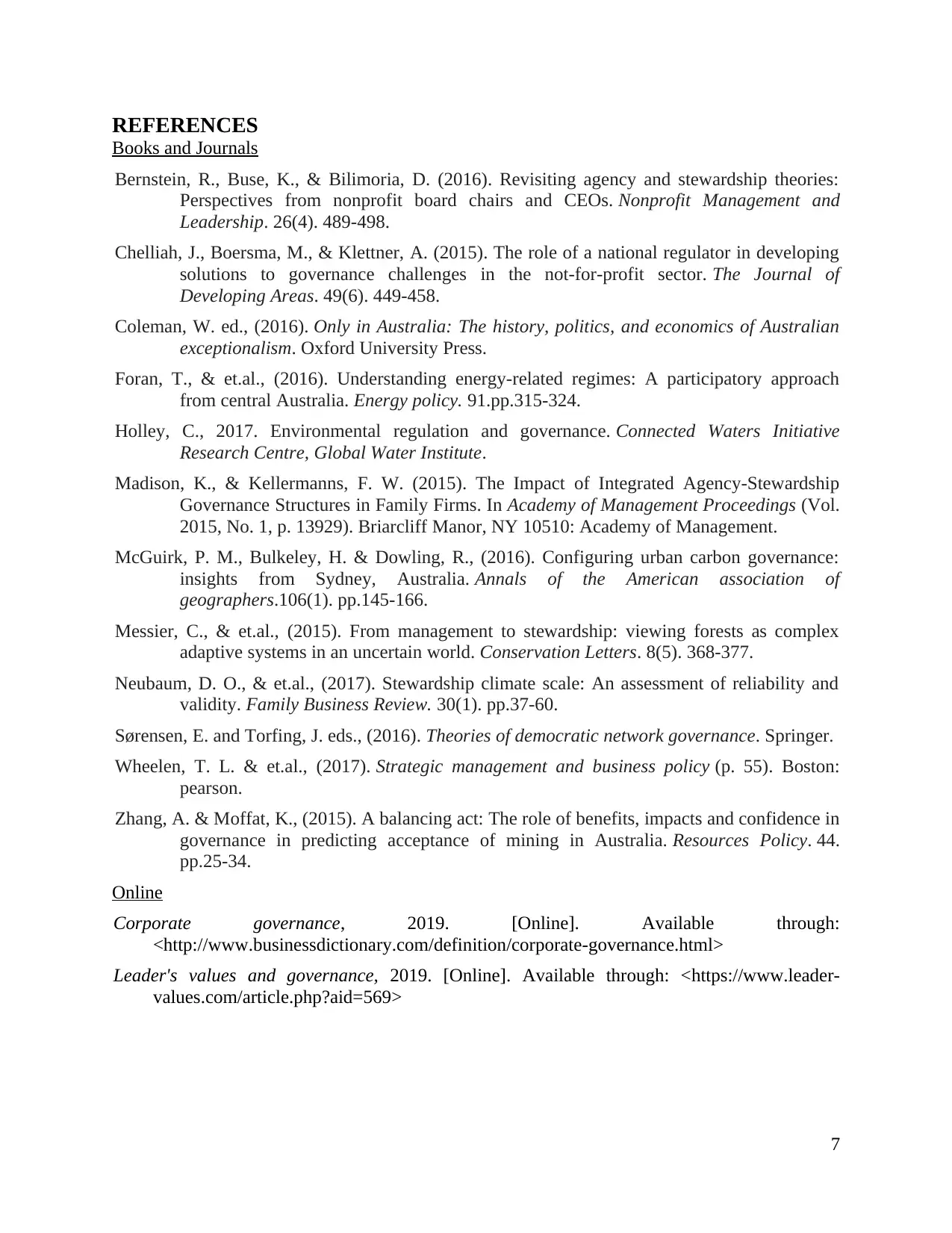
REFERENCES
Books and Journals
Bernstein, R., Buse, K., & Bilimoria, D. (2016). Revisiting agency and stewardship theories:
Perspectives from nonprofit board chairs and CEOs. Nonprofit Management and
Leadership. 26(4). 489-498.
Chelliah, J., Boersma, M., & Klettner, A. (2015). The role of a national regulator in developing
solutions to governance challenges in the not-for-profit sector. The Journal of
Developing Areas. 49(6). 449-458.
Coleman, W. ed., (2016). Only in Australia: The history, politics, and economics of Australian
exceptionalism. Oxford University Press.
Foran, T., & et.al., (2016). Understanding energy-related regimes: A participatory approach
from central Australia. Energy policy. 91.pp.315-324.
Holley, C., 2017. Environmental regulation and governance. Connected Waters Initiative
Research Centre, Global Water Institute.
Madison, K., & Kellermanns, F. W. (2015). The Impact of Integrated Agency-Stewardship
Governance Structures in Family Firms. In Academy of Management Proceedings (Vol.
2015, No. 1, p. 13929). Briarcliff Manor, NY 10510: Academy of Management.
McGuirk, P. M., Bulkeley, H. & Dowling, R., (2016). Configuring urban carbon governance:
insights from Sydney, Australia. Annals of the American association of
geographers.106(1). pp.145-166.
Messier, C., & et.al., (2015). From management to stewardship: viewing forests as complex
adaptive systems in an uncertain world. Conservation Letters. 8(5). 368-377.
Neubaum, D. O., & et.al., (2017). Stewardship climate scale: An assessment of reliability and
validity. Family Business Review. 30(1). pp.37-60.
Sørensen, E. and Torfing, J. eds., (2016). Theories of democratic network governance. Springer.
Wheelen, T. L. & et.al., (2017). Strategic management and business policy (p. 55). Boston:
pearson.
Zhang, A. & Moffat, K., (2015). A balancing act: The role of benefits, impacts and confidence in
governance in predicting acceptance of mining in Australia. Resources Policy. 44.
pp.25-34.
Online
Corporate governance, 2019. [Online]. Available through:
<http://www.businessdictionary.com/definition/corporate-governance.html>
Leader's values and governance, 2019. [Online]. Available through: <https://www.leader-
values.com/article.php?aid=569>
7
Books and Journals
Bernstein, R., Buse, K., & Bilimoria, D. (2016). Revisiting agency and stewardship theories:
Perspectives from nonprofit board chairs and CEOs. Nonprofit Management and
Leadership. 26(4). 489-498.
Chelliah, J., Boersma, M., & Klettner, A. (2015). The role of a national regulator in developing
solutions to governance challenges in the not-for-profit sector. The Journal of
Developing Areas. 49(6). 449-458.
Coleman, W. ed., (2016). Only in Australia: The history, politics, and economics of Australian
exceptionalism. Oxford University Press.
Foran, T., & et.al., (2016). Understanding energy-related regimes: A participatory approach
from central Australia. Energy policy. 91.pp.315-324.
Holley, C., 2017. Environmental regulation and governance. Connected Waters Initiative
Research Centre, Global Water Institute.
Madison, K., & Kellermanns, F. W. (2015). The Impact of Integrated Agency-Stewardship
Governance Structures in Family Firms. In Academy of Management Proceedings (Vol.
2015, No. 1, p. 13929). Briarcliff Manor, NY 10510: Academy of Management.
McGuirk, P. M., Bulkeley, H. & Dowling, R., (2016). Configuring urban carbon governance:
insights from Sydney, Australia. Annals of the American association of
geographers.106(1). pp.145-166.
Messier, C., & et.al., (2015). From management to stewardship: viewing forests as complex
adaptive systems in an uncertain world. Conservation Letters. 8(5). 368-377.
Neubaum, D. O., & et.al., (2017). Stewardship climate scale: An assessment of reliability and
validity. Family Business Review. 30(1). pp.37-60.
Sørensen, E. and Torfing, J. eds., (2016). Theories of democratic network governance. Springer.
Wheelen, T. L. & et.al., (2017). Strategic management and business policy (p. 55). Boston:
pearson.
Zhang, A. & Moffat, K., (2015). A balancing act: The role of benefits, impacts and confidence in
governance in predicting acceptance of mining in Australia. Resources Policy. 44.
pp.25-34.
Online
Corporate governance, 2019. [Online]. Available through:
<http://www.businessdictionary.com/definition/corporate-governance.html>
Leader's values and governance, 2019. [Online]. Available through: <https://www.leader-
values.com/article.php?aid=569>
7
⊘ This is a preview!⊘
Do you want full access?
Subscribe today to unlock all pages.

Trusted by 1+ million students worldwide
1 out of 9
Related Documents
Your All-in-One AI-Powered Toolkit for Academic Success.
+13062052269
info@desklib.com
Available 24*7 on WhatsApp / Email
![[object Object]](/_next/static/media/star-bottom.7253800d.svg)
Unlock your academic potential
Copyright © 2020–2026 A2Z Services. All Rights Reserved. Developed and managed by ZUCOL.





